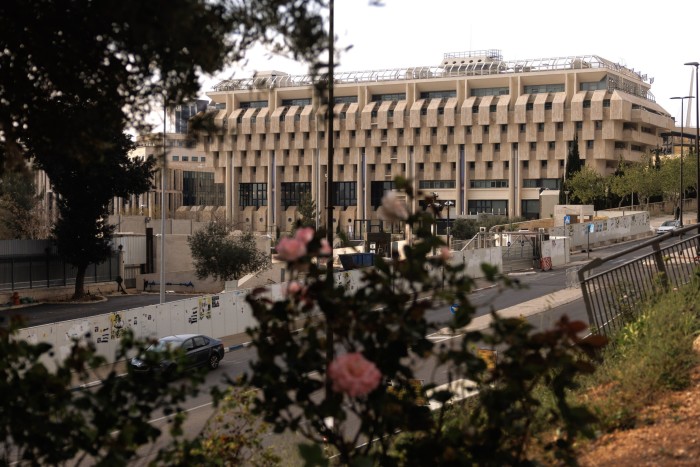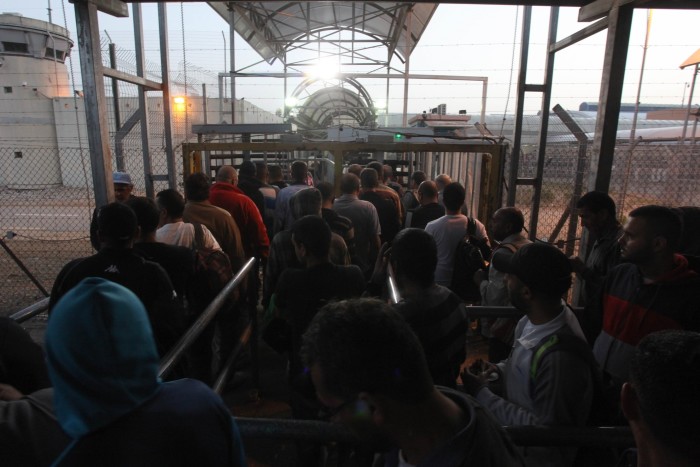
Most businesses worry about not having enough cash. But for lenders in the occupied West Bank, the problem is that they have too much.
The surplus, which stands at Shk4.2bn, is one of numerous strains in a financial system that is also grappling with the fallout from the war in Gaza, and punitive measures imposed by Israel’s ultranationalist finance minister.
Bankers and officials say the cash idling in West Bank vaults, equivalent to more than $1bn, is not only depriving lenders of earnings and complicating transactions, but is also increasingly a target for thieves.
“It’s a problem,” one Palestinian official said of the pile, which is predicted to reach Shk8bn by the year-end, a figure equivalent to more than 15 per cent of the West Bank’s economic output. “It creates a lot of difficulties for our banks and for Palestinian traders doing business with Israel.”
The excess stems from a long-standing limit imposed by Israel on the amount of cash West Bank institutions can transfer to the Israeli central bank. West Bank lenders use Israel’s currency in line with economic agreements signed in the 1990s.
Before the war between Hamas and Israel erupted in Gaza on October 7, the main source of physical shekels in the West Bank was Palestinians who commuted to Israel for work and were paid in cash. They brought up to Shk20bn into the West Bank annually, according to a person familiar with the situation, while Palestinian citizens of Israel who crossed the Green Line to shop in the West Bank brought a further Shk6bn-Shk7bn.
But Israel’s central bank only allows West Bank lenders to send it Shk18bn a year, and over time, the banks have been left with increasingly large stocks of physical shekels.

Since the war broke out, Israel has prevented Palestinians from entering its territory for work. But the cash surplus has persisted, because the uncertainty generated by the conflict has led Palestinians who previously kept cash at home to deposit it in banks, while the downturn triggered by the war has led many to spend less. The war has also fuelled the grey economy, which is largely based on cash.
The Bank of Israel told the Financial Times it “set quotas reflecting legitimate economic activity requiring cash deposits”, when it stepped in after Israeli banks stopped providing cash services to Palestinian counterparts in recent years amid concerns over money-laundering and terrorism-financing. It added that the quotas had risen over time and “in some cases, an exceptional quota was granted”.
But others say the cap should be raised or scrapped. The IMF said in 2022 that the limit was “not commensurate to the shekel inflows into the Palestinian banking system”.
“We’re not seeing evidence of laundering of money through the West Bank that requires holding a tight restraint on excess shekels,” said a diplomat. “I would look at [the cap] as a false constraint, but one that [the Israelis] firmly believe in and are not about to change.”
An audit of the Palestinian banking system this year by US, UK and Swedish officials found it exceeded international thresholds for countering terror-financing, according to people familiar with the process.
The most direct impact of the cap on Palestinian lenders is that it deprives them of income. The IMF estimated in 2022 that holding excess shekel cash lowered Palestinian banks’ profits by about 20 per cent. According to one Palestinian banker, the lost earnings for the sector amounted to $500mn between 2012 and 2023, much of which has accrued in recent years as interest rates have risen.
“We can’t place it [on deposit to earn interest], we can’t lend it, because we don’t lend physical cash,” the banker said. “This money could be put into the economy and be circulating and producing value.”
The situation also reduces the liquidity available to banks for transactions with Israeli counterparties — forcing them into perverse workarounds. “At times we’ve had to get short-term borrowing to cover transfers and cheques, even though we have 10 times more sitting in our vaults,” the banker said.

Bankers also fret about an increase in thefts. One person familiar with the situation said there were eight armed robberies on banks in the West Bank last year, double the previous year’s total, and at least three so far this year. Other officials said the number was higher.
Some observers think the thefts are as much to do with poor law enforcement as growing cash piles. But a UN official said the problem was being exacerbated by movement restrictions imposed by Israel since October 7, which made it harder for banks to transport cash from less well-protected branches to more secure central vaults.
The amounts involved have so far not been significant in terms of banks’ finances. But the UN official said the thefts also raised security concerns. “The more robberies there are, the more guns there are, the greater the risk of an incident that cannot be de-escalated,” the official said.
In a bid to ease the pressure, Palestinian banks have over the years tried charging customers for deposits, and have on occasion refused to take shekel cash deposits at all because of the lack of storage space. The Bank of Israel has also sometimes — as it did earlier this year — allowed allocations from one quarter to be brought forward to the one before.
But for the moment, diplomats see little chance of the threshold being raised on a more sustained basis, given the level of hostility from Benjamin Netanyahu’s government — in which ultranationalists such as finance minister Bezalel Smotrich hold key roles — to making any concessions to the Palestinians.
Since the start of the war Smotrich has restricted transfers of revenues Israel collects on behalf of the Palestinian Authority, which exercises limited self-rule in the West Bank. He has also threatened not to renew a vital waiver that allows Israeli banks to provide correspondent banking services to Palestinian counterparts.
The diplomat said those two issues had the potential to cause far more immediate damage to the West Bank’s economy than the shekel surplus.
But they added that the cash glut also needed addressing. “There’s a fundamental economic reason for wanting to transfer the shekels,” they said. “They’re an economic deadweight.”